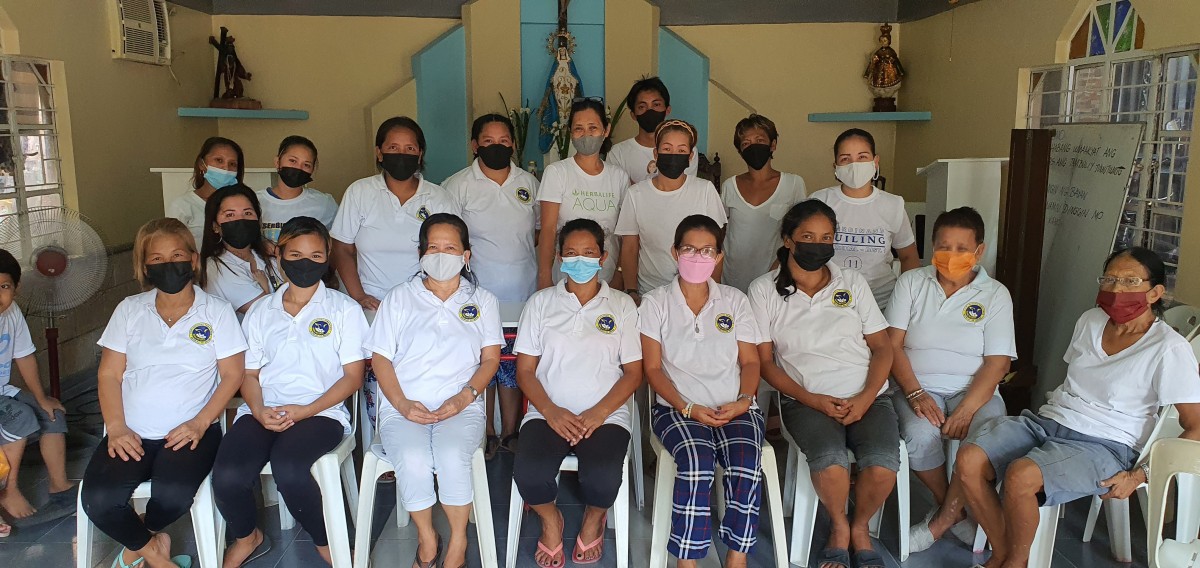A group of impacted mothers showed how an alternative to the violent drug war in the Philippines could be better at community care than killings. The self-named ronda girls hope that the recent national elections in represent will be a chance to shift away from the violence of Duterte’s regime.
Six years after President Rodrigo Duterte waged the war on drugs, the country’s drug situation is nowhere from being the “drug-free Philippines” he promised during the start of his term. Duterte leaves behind a legacy of violence, with his waged drug war resulting in the deaths of 30,000 people, primarily men from impoverished communities. Beyond the extra-judicial killings, the harms inflicted by Oplan Tokhang (the name of Duterte’s flagship anti-drugs programme) are also felt by the left-behind families, the women and children suffering from trauma and poverty exacerbated by the drug war. Despite all the bloodshed, the war on drugs was still perceived to be a popular policy among Filipinos, together with the entirety of Duterte’s controversial leadership.
While Duterte perceived drug users as animals who do not deserve to live, drug use as a criminal problem, and all-out war as the only means to resolve the country’s “drug crisis,” a group of women in Pateros showed how care and compassion can bring peace and order to communities. This group of 35 women, comprised of mostly mothers and grandmothers, call themselves the Ronda ng Kababaihan, or Women’s Patrol. They are a volunteer organisation in Sitio Pagkakaisa, Pateros dedicated to imposing city ordinances in their village by conducting night patrols. Instead of using force and guns, the women arm themselves with only their moral authority as mothers and rapport with the neighbourhood as weapons.
The birth of the organisation can be traced to the night of December 14, 2016, when two neighbours were killed by vigilantes known as the Bonnet Gang. It was the first case of extra-judicial killing in Sitio Pagkakaisa, a clear sign that the drug war had crept into their community. During that time, the Bonnet Gang killed 60 “drug suspects” in Pateros, just eight months after Duterte assumed office.
The execution of their neighbours greatly traumatised their village. The mothers described how their children would scream “May bonnet! May Bonnet!” just within the sight of someone in a helmet or at the sound of a motorcycle in the street, and how their husbands and sons would rather sleep in their workplace than be seen walking outside at night. The mothers narrated how Sitio Pagkakaisa was reduced into a ghost town that December. No one would dare go out when night-time fell for fear of being the next tokhang victim. The only brave presence in the streets was that of the mothers, patiently waiting for their husbands and sons to come home safely from work each night.
It is within these circumstances that the women of Pateros were compelled to take action, through night patrols and imposed curfews, thereby clearing the streets free of potential targets of tokhang. From their perspective, since they were already outside, they might as well work together to ensure the safety of their neighbourhood. The women were motivated, and would voluntarily patrol to protect their husbands and sons from mistaken identities, stray bullets, and drug killings. They were against the violence brought by Oplan Tokhang and its inhumane treatment of individuals accused of using drugs. The leader of the ronda girls explained: “God is forgiving; why not give them a chance to change? Why not let them undergo rehabilitation? Yet, their judgment is the most heinous punishment. Despite their desperate pleas, you will just find out they have already been killed.”

The ronda girls on patrol with the Philippines National Police. Source: Ronda ng Kababaihan Facebook page
The drug war, waged on men in impoverished communities like Sitio Pagkakaisa, meant there were none left, or none brave enough, to patrol the streets. Someone must watch over the neighbourhood at night to deter any further attacks from vigilantes. It is this literal and symbolic space in their village that the women took up by taking on the responsibility as ronda girls (patrol girls), a duty that only the women could carry. As recalled by one of their senior members: “The group was created because the men were scared, right? The women must stand guard.”
The civic duty of the ronda girls transcended beyond resisting drug-related violence. These women also expanded their volunteerism through their assistance in funeral services, fiestas, outreach programmes, and other events of the municipality, all geared towards public service. They also served as partners of the local police in maintaining peace and order as they patrolled side by side in the streets of Sitio Pagkakaisa. Even when COVID-19 broke out and the Philippines went into lockdown, Ronda ng Kababaihan served on the pandemic’s frontlines, continuing their patrols to help impose curfew hours and enforce mask mandates within their neighbourhood.
Despite the police having provided the ronda girls with the authority to issue tickets to individuals who violated health protocols, the women refused to do so for fear of ensuing conflict among their neighbours and turning them into enemies. Instead, they preferred relying on communication, calling out violators, reminding them of the ordinances, and giving them a chance to correct their behaviour before calling the attention of the police. During the peak of Oplan Tokhang, they similarly relied on maintaining a cooperative relationship in Sitio Pagkakaisa anchored on rapport, trust, and respect. This gendered engagement—rooted in their role as mothers and practice of mothering—allowed them to gain support from their community and police. More importantly, through their long dedication to patrol duties, they succeeded in ensuring that the tokhang in 2016 would be the first and last killing their neighbourhood would suffer. The bravery and commitment of these mothers and grandmothers to the safety of their village was recognised as one of the “best practices” by the Pateros police, given their contributions to crime reduction and the increase in trust in the police within their community.
In the recently concluded national elections of 2022, the Pateros women also voluntarily participated in the campaign with the hopes of electing a leader who would end the drug killings and value the lives of the poor. The majority of their members voted for Vice President Leni Robredo, who supported Ronda ng Kababaihan’s initiative since 2018. While the election of Ferdinand “Bongbong” Marcos Jr. dismayed them, they could only accept the outcome and hope that the new administration would focus on the welfare of the Filipinos.
As for the leader of the ronda girls, she is hoping that the incoming administration will not continue the cruel drug war of President Duterte. She added, “I hope he [ “Bongbong” Marcos Jr.] has his own mindset, and he won’t be a puppet of the outgoing administration.” Some of the women were wary of the looming possibility that Sara Duterte, the daughter of the out-going president, would assume the executive role if there are any attempts to impeach Marcos Jr., similarly to what happened to the former President Joseph Estrada in 2001. For them, another Duterte as president would mean another harrowing term of senseless killings. From the women’s perspective, a Marcos would be preferable to another Duterte sitting in the highest office.
With the entry of the new administration, the mothers and grandmothers of Ronda ng Kababaihan still intend to continue their duties as the night watchers of Sitio Pagkakaisa. For as long as they can and for as long as there is support, they will continue sacrificing their nights for a safer Pateros. While the case of the Pateros mothers serves as a testament that peace and order within a community can be achieved through a mother’s care, the reality that the government outsources and exploits the unpaid labor of urban poor women for social control must not be ignored. To ensure the longevity of their grassroots initiative, the local government of Pateros must commit to the empowerment of women’s participation by institutionalising their organisation and extending support to the members by providing allowances and equipment for the night patrols.
As the saying goes, “it takes a village to raise a child.” In the case of Ronda ng Kababaihan, they showed how amidst a crisis of human rights, it takes a village led by fearless mothers to protect the life of every man and child.
*Marielle Y. Marcaida is an assistant professor at the Department of Political Science of the University of the Philippines Diliman. Her research focuses on political activism, motherist politics, and the Philippine drug war.


